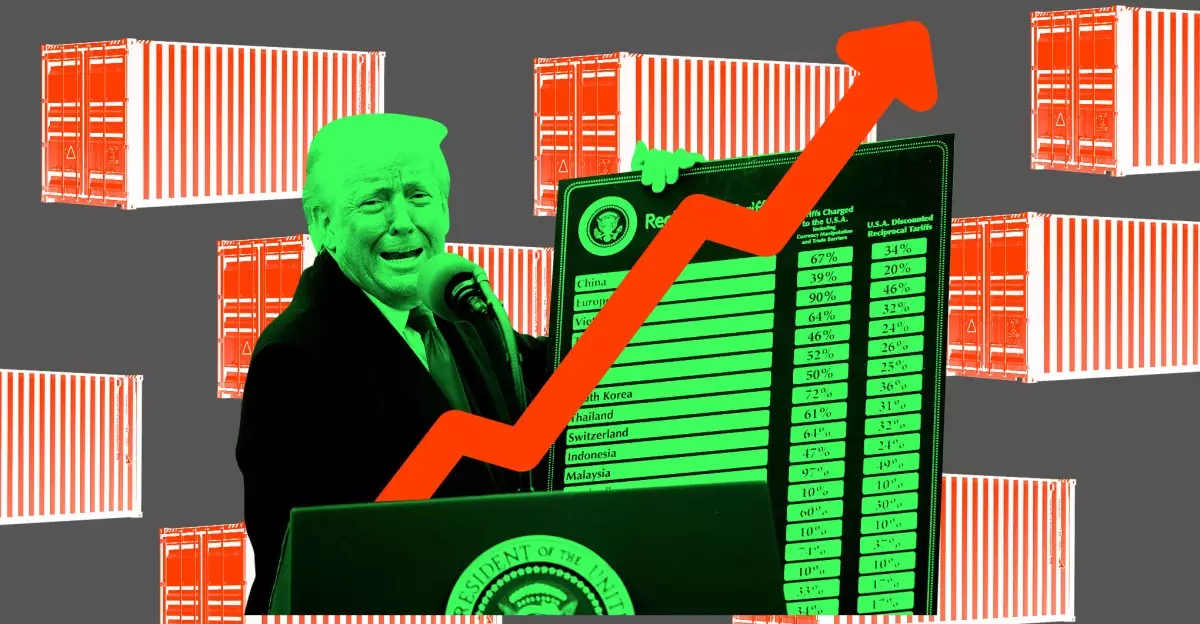The relationship between the tech industry and government has never been straightforward, but the current geopolitical landscape has added more complexity than ever before. Companies like Meta, Apple, Tesla, and TikTok find themselves ensnared in a tangled web of trade disputes and regulatory scrutiny, particularly from the United States. What was once perceived as a mutual alliance is quickly morphing into an arena of conflict, revealing the darker underbelly of a sector that has long enjoyed an unassailable position of influence.
The irony here is palpable; the very leaders who lavished support on the new administration may soon find themselves regretting their political allegiances. As the narrative evolves, it seems the tech giants bet wrong on President Donald Trump, who now appears more interested in leveraging these companies as pawns in his global trade agenda than in nurturing a healthy business environment. This shifting dynamic stands in stark contrast to the expectations set by executives who believed they had secured a favorable relationship with the administration.
The EU and the Rise of Tariff Tensions
Ursula von der Leyen, European Commission President, has entered the fray, proposing a potential levy on the advertising revenues of digital services if tariff negotiations with the U.S. collapse. This proposed tax could be disastrous for companies like Meta and Apple, not only intensifying existing tensions but also threatening their operating models in a highly competitive market. In what should have been an opportunity for mutual growth, the tech sector now finds itself facing the fallout of cross-continental disputes.
The stark reality is that this isn’t merely about tariffs; it’s also about public sentiment and trust. Companies like Meta have spent years in the spotlight, battling accusations of privacy violations and misinformation. Adding the threat of tariffs and sanctions will only exacerbate their public relations woes, particularly within the European Union, where regulatory frameworks are increasingly stringent.
A Fragile Ecosystem: The Case of TikTok
Amidst this chaos, TikTok finds itself in a precarious position that serves as a cautionary tale for tech companies. With the heightened scrutiny and aggression from the Trump administration towards China, TikTok faces severe operational and financial ramifications. The app’s leadership is caught between trying to appease U.S. regulators while maintaining their Chinese roots, a tightrope that could shatter under the weight of dual pressures.
Commentators have pointed out that TikTok’s extended deadlines for a potential deal in the U.S. market illustrate the broader foreboding atmosphere surrounding China’s tech ventures. This conflict is not merely about business; it’s a reflection of a growing divide rooted in geopolitical anxieties that could soon bubble over into more tangible restrictions. With growing bipartisan consensus in Washington to act against perceived threats from China, TikTok’s survival in the U.S. remains tenuous at best.
OpenAI and the Charitable Mirage
Meanwhile, OpenAI’s decision to transition from a non-profit to a more commercially viable structure has generated waves of backlash from former employees and critics alike. The organization’s shift raises an essential question: has OpenAI exploited its charitable status to the detriment of industry standards? Consumers and technologists are left grappling with fears that the pursuit of profit could eclipse foundational ethical guidelines.
This situation casts a shadow not just on OpenAI but also on the tech ecosystem at large. Companies must recognize that their actions hold significant influence, and ethical missteps can precipitate crises, pushing regulators to step in. While profit motives are inherent to business practices, technology firms must tread carefully to maintain their legitimacy.
The Layoff Paradox at Google
In another corner of the tech landscape, Google faces significant internal turmoil with unanticipated layoffs causing unrest. Employees at all levels are scrutinizing the company’s motivations and strategies, and some are left baffled by the perceived lack of transparency regarding layoffs. The terms of severance packages, while more generous than expected, highlight a growing disconnect between management and workforce sentiments. This contradiction forces questions about leadership effectiveness and the long-term vision for company culture.
Such incidents disturb the intricate balance between stability and growth in the tech sector. Employees who feel disposable are less likely to innovate, which is detrimental to one of the industry’s core tenets. As layoffs become increasingly common, leaders must exercise caution and prioritize communication to maintain trust.
The Broader Implications for Big Tech
As the global tech landscape continues to evolve, it becomes evident that the industry’s leaders must prepare for challenges that transcend mere business metrics. They are now essential players on the global stage, subjected to the whims of political machinations and public perception. The risks are substantial; navigating this tumultuous environment successfully will require not just strategic acumen but also a reinvigoration of ethical standards and corporate responsibility.
In an era where big tech is often vilified as both a boon and a bane for society, it’s crucial not only for these companies to innovate but also to act as responsible players in the geopolitical narrative. If they fail to adapt, they may find themselves on the losing side of an increasingly hostile landscape.

